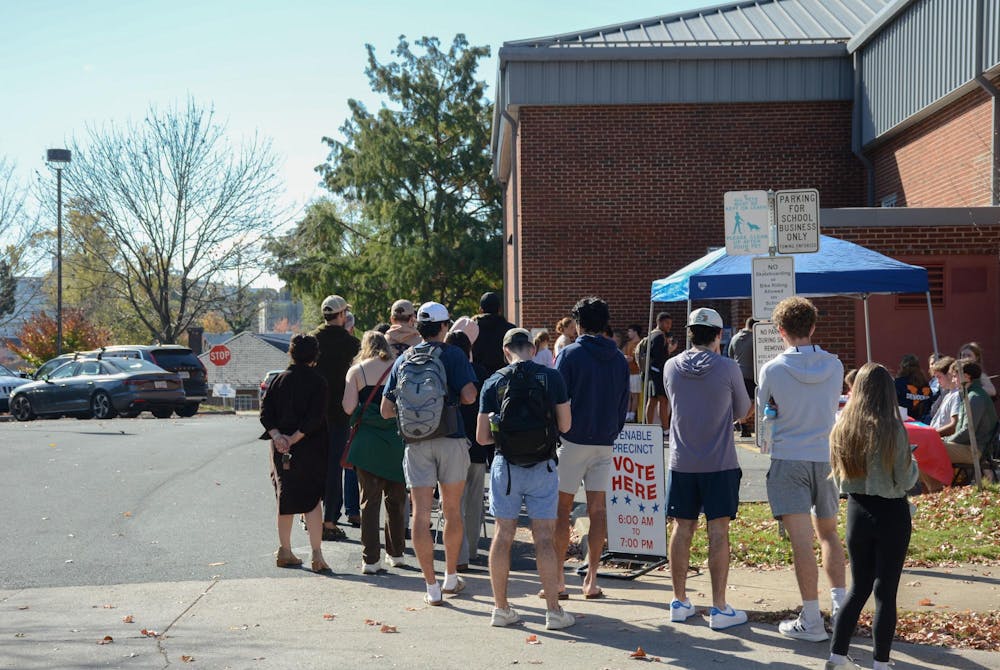Millions of Americans cast their votes Tuesday in what has been labeled one of the most important elections in the country’s history, and students at the University were no exception. Charlottesville’s ballot had four races — including a Senate seat, a House of Representatives seat and a referendum that would amend the Commonwealth’s constitution, expanding tax relief status for families of deceased veterans.
To most students, as well as many others across the country, the most important item on every ballot was the presidency. The past five months have seen an especially tumultuous race, with President Joe Biden withdrawing in July and Vice President Kamala Harris replacing him at the top of the Democratic ticket. The then-expedited campaigning process pitted Harris against former President Donald Trump, running for the third consecutive time after losing to Biden in 2020.
While students went to bed not knowing the final results of the presidential election, the Associated Press called Virginia a win for Harris at 11:43 p.m. Tuesday. Incumbent Democrat Sen. Tim Kaine won his election over Republican Navy veteran Hung Cao. Additionally, Republican State Sen. John McGuire won the election for Virginia’s 5th congressional district — beating Democrat Gloria Witt.
Across Grounds, resources were made available to encourage student voting and engagement with the election. The Center for Politics, for example, offered shuttles to polling locations and other non-partisan resources, including information around voting processes and laws. Student Health and Wellness provided counseling and support resources, including drop-in sessions, to help students worried or stressed out by the election and its results. SHW also encouraged healthy behaviors on Grounds, including physical exercise and avoiding spending too much time on a phone or computer.
Students voted at a variety of locations, the closest to Central Grounds being at Slaughter Recreation Center. Over the course of the day, that location saw over 1,000 voters, with hundreds of additional provisional ballots being cast by same-day registrants, according to election officials. Other nearby locations included the Miller Center, Trailblazer Elementary School and Johnson Elementary School.
For many students, this election marked the first time they could vote in the presidential race, and for some it was their first time voting at all.
In interviews conducted outside of polling stations, multiple University students said they felt that this election was particularly significant for the future of the country. Second-year College Student Brendan Toney said in an interview shortly after voting that he decided to vote for the first time due to the stakes of the elections.
“It’s my first time voting … I thought I would exercise my right to vote,” Toney said. “It’s a very pivotal election to me and most people, so I want to have my voice counted.”
The sentiment of these elections being of particular importance is not limited to the presidential race. A practically even split in the Senate and a House with a razor thin Republican majority of only eight seats, as well as increasingly polarized local politics, have motivated many young people to engage in the democratic process. Among these young voters is first-year College student Hermela Techane, who said she had been paying attention to all races on the ballot.
“As a young American, I really care about the issues that are going to affect my generation and my future kids,” Techane said. “I think it's really important to do your civic duty and vote for things that matter to you.”
The race for the presidency in particular, however, mobilized students to get out and vote. Fourth-year College student Leilani Johnson said that it was that race in particular that motivated her to vote due to its implications for American women and people of color.
For some out-of-state students invested in national politics, registering to vote in Virginia allowed them to cast their ballot in a jurisdiction more heavily contested than their home state. First-year College student Cecilia Sherman, originally from the historically Democratic leaning New Jersey, said she was concerned about protecting women’s rights and access to abortion, and that she felt that voting in Virginia gave her vote more weight.
“I’m from New Jersey, so it’s exciting to be in a state where there’s a little bit more competition when it comes to which way it’ll sway,” Sherman said.
While it is unknown how long it will be until the dust settles and we know who will be the 47th President of the United States, Trump exited election day with leads in many battleground states and wins already called in others. More is expected to become clear in the coming days — in 2020, the final winner was not announced until the Saturday after the election — and the next president is set to assume office Jan. 20.







